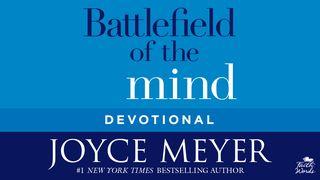Unwavering Conformity: A 21-day Study in Stewardship預覽

Rule of Love
In this chapter Paul has drawn the outline of the new self that each Christian is to put on. It is a self ruled by the love of Jesus (see Col 3:14), characterized by forgiveness, harmony, peace and thanksgiving. Paul's overarching rule of life is that every word and every deed be done in the name of Jesus (see Col 3:17). Following such a rule affects our outlook on life. We begin to wake each morning with the sense that we are serving Jesus himself. It is this rule of love that Clement of Rome (c. 40-c. 97), a first-century contemporary of the apostles, describes.
“Who can describe the [blessed] bond of the love of God? What man is able to tell the excellence of its beauty, as it ought to be told? The height to which love exalts is unspeakable. Love unites us to God. Love covers a multitude of sins. Love beareth all things, is long-suffering in all things. There is nothing biased, nothing arrogant in love. Love admits of no schisms: love gives rise to no seditions; love does all things in harmony.”
The rule of love is to be applied, Paul implies, in the stewardship of all our relationships, both outside the family - in public and in work life (see Col 3:22-4:1; Eph 6:5-9) - and within the family (see Col 3:18-21; Eph 5:22-6:4).
Families exemplify harmony when people have a goal of submission to one another (Eph 5:21): wives esteem and honor their husbands; husbands cherish and value their wives and work to meet their needs; children are cooperative and teachable; parents discipline with gentle love - encouraging their children toward growth in health, wisdom and maturity. Quaker author, philosopher and theologian D. Elton Trueblood (1900-1994) applies the rule of love to relationships within the family. He explains that the family is the custodian of the image of the Triune relationship revealed to us in Jesus Christ, who is the only true example of life's highest ideal.
“The family is the one institution in which it is possible to say 'we' without any loss of individuality. It is each for all and all for each, as is never the case in a secular society and seldom in a religious society. To say 'we' and to mean it, is a very great spiritual achievement for the nominative plural is the noblest of the personal pronouns. A family in which each does what he can, each receives what he needs, wholly without financial calculation of earning or merit, represents the highest known ideal, our only true approximation to the Kingdom of God, yet countless families, made up of fallible persons, demonstrate this ideal in great measure every day of their lives.”
But Paul isn't finished. In his further instructions, he says that putting on Christ means that Christians are to be people of prayer, giving thanks (see Col 4:2). Only with prayer are harmonious relationships possible.
In this chapter Paul has drawn the outline of the new self that each Christian is to put on. It is a self ruled by the love of Jesus (see Col 3:14), characterized by forgiveness, harmony, peace and thanksgiving. Paul's overarching rule of life is that every word and every deed be done in the name of Jesus (see Col 3:17). Following such a rule affects our outlook on life. We begin to wake each morning with the sense that we are serving Jesus himself. It is this rule of love that Clement of Rome (c. 40-c. 97), a first-century contemporary of the apostles, describes.
“Who can describe the [blessed] bond of the love of God? What man is able to tell the excellence of its beauty, as it ought to be told? The height to which love exalts is unspeakable. Love unites us to God. Love covers a multitude of sins. Love beareth all things, is long-suffering in all things. There is nothing biased, nothing arrogant in love. Love admits of no schisms: love gives rise to no seditions; love does all things in harmony.”
The rule of love is to be applied, Paul implies, in the stewardship of all our relationships, both outside the family - in public and in work life (see Col 3:22-4:1; Eph 6:5-9) - and within the family (see Col 3:18-21; Eph 5:22-6:4).
Families exemplify harmony when people have a goal of submission to one another (Eph 5:21): wives esteem and honor their husbands; husbands cherish and value their wives and work to meet their needs; children are cooperative and teachable; parents discipline with gentle love - encouraging their children toward growth in health, wisdom and maturity. Quaker author, philosopher and theologian D. Elton Trueblood (1900-1994) applies the rule of love to relationships within the family. He explains that the family is the custodian of the image of the Triune relationship revealed to us in Jesus Christ, who is the only true example of life's highest ideal.
“The family is the one institution in which it is possible to say 'we' without any loss of individuality. It is each for all and all for each, as is never the case in a secular society and seldom in a religious society. To say 'we' and to mean it, is a very great spiritual achievement for the nominative plural is the noblest of the personal pronouns. A family in which each does what he can, each receives what he needs, wholly without financial calculation of earning or merit, represents the highest known ideal, our only true approximation to the Kingdom of God, yet countless families, made up of fallible persons, demonstrate this ideal in great measure every day of their lives.”
But Paul isn't finished. In his further instructions, he says that putting on Christ means that Christians are to be people of prayer, giving thanks (see Col 4:2). Only with prayer are harmonious relationships possible.
關於此計劃

As Christ-followers we acknowledge that Jesus is not only our Savior, but also our Lord. We recognize that everything belongs to Him and that we’re only stewards of His good gifts. Through this plan’s devotional content and brief Scripture readings, you’ll discover that being a good steward of those gifts requires that we become more and more like Him—the essence of conformity.
More
We'd like to thank The Stewardship Council, creators of Zondervan's NIV Stewardship Study Bible, for the structure of Unwavering Conformity: A 21-day Study in Stewardship. For more information about this plan, the NIV Stewardship Study Bible, or hundreds of stewardship resources, please visit their site at http://www.stewardshipcouncil.net/

